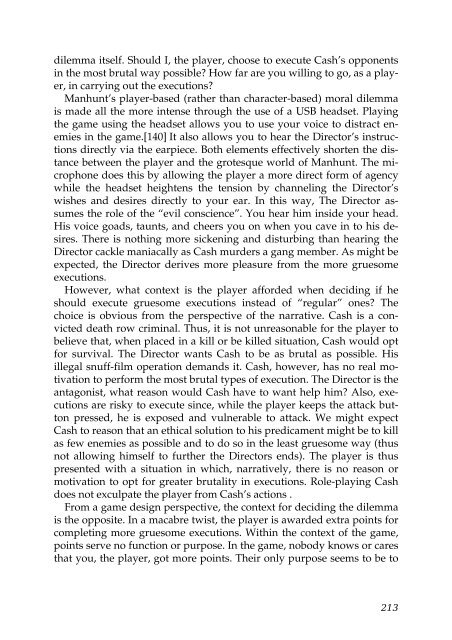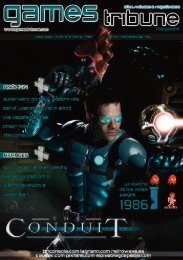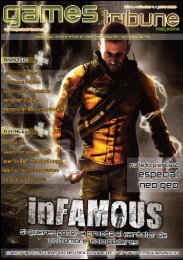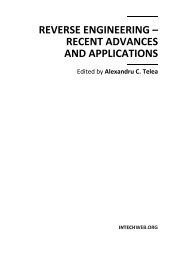Well Played 2.0: Video Games, Value and Meaning - OpenLibra
Well Played 2.0: Video Games, Value and Meaning - OpenLibra
Well Played 2.0: Video Games, Value and Meaning - OpenLibra
You also want an ePaper? Increase the reach of your titles
YUMPU automatically turns print PDFs into web optimized ePapers that Google loves.
dilemma itself. Should I, the player, choose to execute Cash’s opponents<br />
in the most brutal way possible? How far are you willing to go, as a player,<br />
in carrying out the executions?<br />
Manhunt’s player-based (rather than character-based) moral dilemma<br />
is made all the more intense through the use of a USB headset. Playing<br />
the game using the headset allows you to use your voice to distract enemies<br />
in the game.[140] It also allows you to hear the Director’s instructions<br />
directly via the earpiece. Both elements effectively shorten the distance<br />
between the player <strong>and</strong> the grotesque world of Manhunt. The microphone<br />
does this by allowing the player a more direct form of agency<br />
while the headset heightens the tension by channeling the Director’s<br />
wishes <strong>and</strong> desires directly to your ear. In this way, The Director assumes<br />
the role of the “evil conscience”. You hear him inside your head.<br />
His voice goads, taunts, <strong>and</strong> cheers you on when you cave in to his desires.<br />
There is nothing more sickening <strong>and</strong> disturbing than hearing the<br />
Director cackle maniacally as Cash murders a gang member. As might be<br />
expected, the Director derives more pleasure from the more gruesome<br />
executions.<br />
However, what context is the player afforded when deciding if he<br />
should execute gruesome executions instead of “regular” ones? The<br />
choice is obvious from the perspective of the narrative. Cash is a convicted<br />
death row criminal. Thus, it is not unreasonable for the player to<br />
believe that, when placed in a kill or be killed situation, Cash would opt<br />
for survival. The Director wants Cash to be as brutal as possible. His<br />
illegal snuff-film operation dem<strong>and</strong>s it. Cash, however, has no real motivation<br />
to perform the most brutal types of execution. The Director is the<br />
antagonist, what reason would Cash have to want help him? Also, executions<br />
are risky to execute since, while the player keeps the attack button<br />
pressed, he is exposed <strong>and</strong> vulnerable to attack. We might expect<br />
Cash to reason that an ethical solution to his predicament might be to kill<br />
as few enemies as possible <strong>and</strong> to do so in the least gruesome way (thus<br />
not allowing himself to further the Directors ends). The player is thus<br />
presented with a situation in which, narratively, there is no reason or<br />
motivation to opt for greater brutality in executions. Role-playing Cash<br />
does not exculpate the player from Cash’s actions .<br />
From a game design perspective, the context for deciding the dilemma<br />
is the opposite. In a macabre twist, the player is awarded extra points for<br />
completing more gruesome executions. Within the context of the game,<br />
points serve no function or purpose. In the game, nobody knows or cares<br />
that you, the player, got more points. Their only purpose seems to be to<br />
213

















